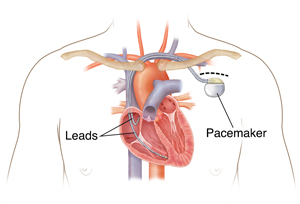Syncope is a medical term for fainting or passing out. If your fainting was caused by a heartbeat problem (arrhythmia) or other heart problem, treatment may improve blood flow, prevent syncope, and help prevent more heart problems. Some of these treatments are discussed below. Your healthcare provider can explain the benefits and risks of each treatment.
Pacemaker or ICD
These devices can help speed up or slow down your heartbeat. They're implanted under the skin in the chest during a simple surgery. Once you have a pacemaker or an ICD, you'll need to follow up with your healthcare provider at regular intervals. This is to be sure your device is working correctly and to keep track of your heart rhythm.
A pacemaker
A pacemaker can prevent your heart from beating too slowly. When needed, the pacemaker sends an electrical impulse to the heart, telling it to beat faster (at a minimum rate).
 |
| A pacemaker in place. (An ICD looks similar and is implanted in the same area of the body.) |
An ICD
An ICD (implantable cardioverter defibrillator) treats fast, dangerous heart rhythms. It can do this by:
An ICD can also act as a pacemaker, if needed, to help support a slow heart rate.
Other treatments
In some cases, your healthcare provider may suggest a procedure or surgery. These can be a long-term solution for certain heart problems:
Catheter ablation
Catheter ablation treats a fast heartbeat. It works by finding and destroying abnormal circuits using either heat or cold therapy. This is a nonsurgical procedure. It's done by threading thin wires (catheters) through a vein in the leg and guiding them to the heart. The wires are used to find the location of the abnormal circuits and destroy those cells.
Heart valve surgery
This may be an option if syncope is caused by an abnormal heart valve. Most often, this condition is caused by severe narrowing of the aortic valve. This is the valve that opens to let blood out to your body. The valve is then replaced with a new healthy valve (either mechanical or prosthetic). This can restore normal blood flow through the heart and prevent syncope. If you need a valve replacement, you'll be evaluated by a multidisciplinary heart valve team. They can help you find out which procedure is best for your condition. For some people, a new valve can be placed with a less invasive procedure. This is called transcatheter aortic valve replacement (TAVR) and does not need heart surgery.
Alcohol septal ablation or surgical septal myectomy
In some people, blood can't leave the heart. That's because the muscle becomes enlarged or thickened (hypertrophied) along one of the ventricle walls (septum). Sometimes medicine can relax this area of the heart. Then blood can move out to the body. But in other cases the tract through the heart is too narrow. Blood still can't get out to the body or to the brain. This can cause syncope. Your healthcare provider can thin out the muscle and improve blood flow using a catheter to apply alcohol directly to the muscle, or open surgery to trim the muscle.
Coronary stents or bypass surgery
When the arteries feeding the heart muscle become very narrowed it can cause a heart attack and irregular heart rhythms. This can affect blood pressure and circulation of oxygen and blood to the brain. It may cause syncope. Restoring blood flow to the heart muscle improves blood pressure. And it improves circulation to the brain and all parts of the body. If you have coronary artery disease, you may need these blockages treated with stents. These are small mesh tubes that fit inside the blood vessels. They keep blood flow open to the artery. Or you may need surgery to go around (bypass) the blocked or narrowed arteries. In some cases, these procedures are planned. Or they may be done as an emergency treatment for a heart attack or acute myocardial infarction.
To know what treatment is best for you, you'll need testing. Until you have a treatment plan, don't do activities that could result in injury to yourself or others if you were to faint. Ask your healthcare provider when it will be safe for you to resume driving, or other activities for work or recreation.